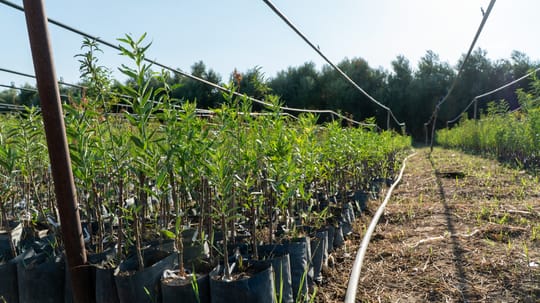– Coming of Age in Tassa Ouirgane, Modern Ghana, by Mark Apel (Community Extension Expert), 17 May 2017.
• Arabic: Al Bayader, 7 July 2017.

Today, farmers along the river valley can no longer depend on the snowmelt and water that flowed out of the mountains to irrigate their fruit and nut trees. This is especially true in the months of June, July and August when barely a trickle flows down their irrigation canals. Conversely, when it rains, it pours. Any attempts to rebuild their garden terraces in the river bottom are frustrated by lower grade floods. Nonetheless, the people of Tassa Ouirgane are resilient and never fail to open their homes to strangers.
There is a deep, abiding compassion in this village for the future of their people as demonstrated by a group of men known as the Tassa Ouirgane Association for the Environment and Culture. In addition, there is a women’s cooperative that was formed with the help of the High Atlas Foundation to help the young women of the village improve their income through the sale of handicrafts. The participatory approach has become the bedrock of the High Atlas Foundation to help communities decide for themselves what their priorities are. This approach was used in 2012 by the Foundation with the residents of Tassa Ouirgane to help them determine where their greatest needs lie, and improving their water infrastructure to irrigate their trees has become paramount.

This year, in April of 2017, it was a happy reunion for me as a HAF and Farmer to Farmer (F2F) Volunteer to return to Tassa Ouirgane and meet with the men’s association that I met with last year as a volunteer. Of course, the stories about my earlier Peace Corps days in this village back in the 80’s were always fun to recount, as I was the first American volunteer to have worked there and in the Park, with many others to follow. Somehow, 30 years later, the tales of my yellow motorcycle and other antics always seem to enter the conversations to the delight of everyone, as we sat around drinking tea and eating lunch at the house of Raiss Si Mohammed Idhna, president of the men’s association. Even though many of these men were small boys back in the mid-80’s, they laughed with the old-timers as if it was just yesterday that I had worked there. The Raiss’s house is situated on the hill with a spectacular view of the park and the Azzeden River Valley – a view that I never grow tired of seeing.
I had an auspicious reason for visiting this group again. Last year, as a HAF and F2F volunteer, I assisted with a grant proposal to the United Nations Development Programme (UNDP) that was awarded just this year in the amount of $48,000. This will go a long way to helping the village fulfill its vision for improved irrigation, flood and erosion control, a new well, solar pump and water storage for the dry times of the year, and lastly, the hallmark of any HAF project, a tree nursery. Tassa Ouirgane already grows a variety of fruits and nuts including olives, walnuts, peaches and plums. However, most of these trees belong to individuals. The goal of HAF is to help rural villages like this one start a community-based tree nursery where they will grow seedlings that will then be distributed to farmers in the valley who don’t have any fruit or nut trees.

Through this UNDP grant, Tassa Ouirgane has the opportunity to become an example of community-based development that is truly in the hands of the community. While here we had the chance to introduce the village to the Director of Projects for UNDP Morocco Ms. Badia Sahmy to the association and discuss the goals and details of the project that her office is so generously funding through HAF. It was interesting to hear the spectrum of ideas behind the grant. For the men’s association, they are finally going to have the opportunity to have the infrastructure they’ve needed to sustain their trees through the dry seasons. For the UNDP, they see this as an opportunity for the village to serve as a model for community resilience once all the pieces are in place. HAF is perfectly positioned to help make both of these views a reality. To kick-start this project, intern Jan Thibaud from Belgium will be spending two months living in Tassa Ouirgane and surveying the other villages in the valley for their potential to start HAF nurseries. Jan is the same age I was when I first arrived in Tassa Ouirgane over 33 years ago as a young man. He will be working with the same sense of commitment and dedication to such a beautiful place and wonderful people. I’m proud to be able to pass along the torch, after all these years, and see Tassa Ouirgane become more resilient in the face of a changing climate and environment.

Mark Apel is a faculty member of the University of Arizona in the US as an Extension Agent working on sustainable development issues. He has recently completed two volunteer consultant assignments in Morocco with the Farmer to Farmer Program, through Land O’Lakes International Development. Mr. Apel has over 30 years of experience working on environmental, land use and sustainability issues.
